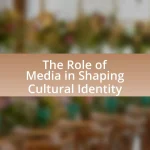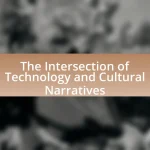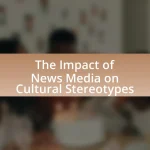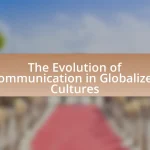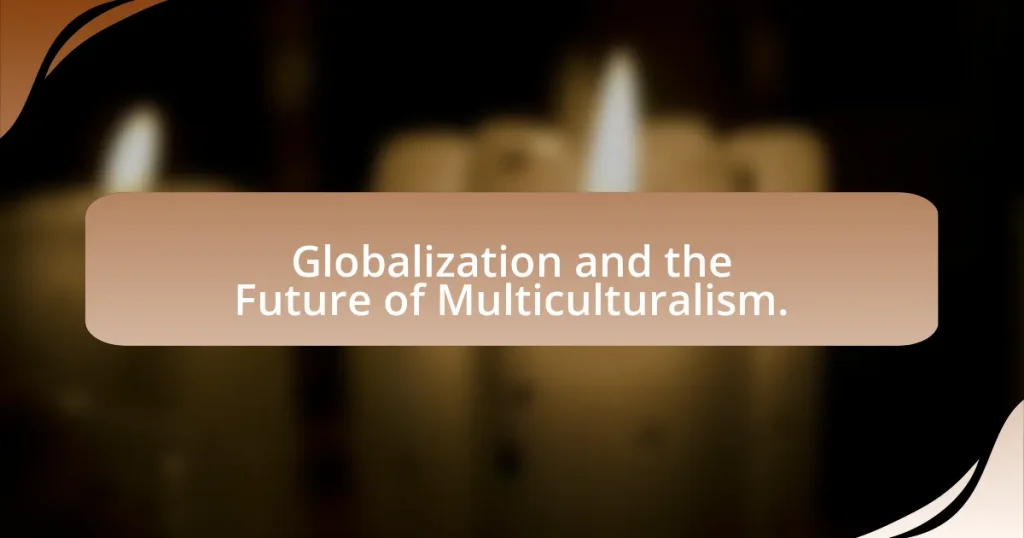Globalization refers to the increasing interconnectedness and interdependence among countries, driven by trade, investment, technology, and cultural exchange. This phenomenon significantly influences multiculturalism by facilitating cultural exchange, enhancing awareness, and creating hybrid identities, while also posing challenges such as cultural homogenization and appropriation. Key factors driving cultural exchange include technological advancements, migration, and social media, which promote interaction among diverse cultures. The article explores the importance of multiculturalism in fostering social cohesion and economic growth, the risks associated with globalization, and the evolving nature of multiculturalism in response to global dynamics. It also discusses strategies for promoting inclusivity and combating xenophobia, highlighting the role of individual responsibility and effective policies in supporting multicultural integration.
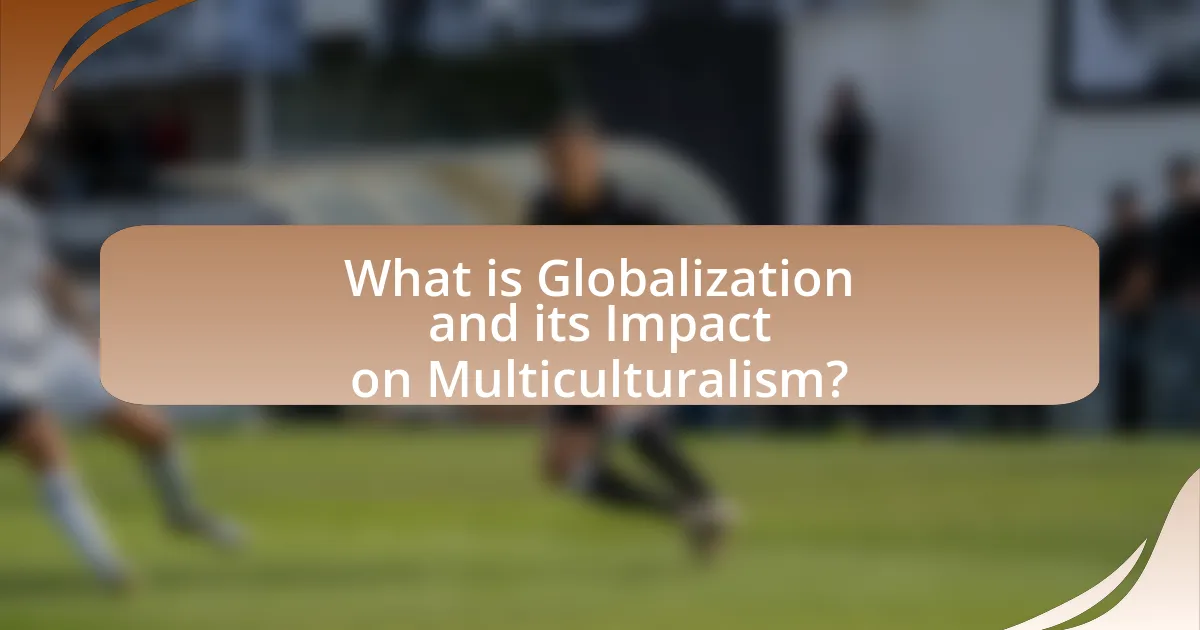
What is Globalization and its Impact on Multiculturalism?
Globalization is the process of increased interconnectedness and interdependence among countries, primarily driven by trade, investment, technology, and cultural exchange. This phenomenon significantly impacts multiculturalism by facilitating the exchange of diverse cultural practices, ideas, and values across borders, leading to greater cultural awareness and interaction. For instance, the rise of global communication technologies allows for the rapid dissemination of cultural content, which can enhance multicultural understanding but may also lead to cultural homogenization, where dominant cultures overshadow local traditions. Research indicates that globalization can both enrich multicultural societies by introducing new perspectives and challenge them by creating tensions between global and local identities.
How does globalization influence cultural exchange?
Globalization significantly influences cultural exchange by facilitating the rapid movement of ideas, goods, and people across borders. This interconnectedness allows diverse cultures to interact, share, and adopt elements from one another, leading to hybrid cultural forms. For instance, the proliferation of the internet and social media platforms enables real-time communication and exposure to various cultural practices, resulting in increased cultural awareness and appreciation. According to a report by the United Nations Educational, Scientific and Cultural Organization (UNESCO), globalization has led to a rise in cultural diversity, as seen in the global popularity of music genres like K-pop and the fusion of culinary traditions worldwide.
What are the key factors driving cultural exchange in a globalized world?
The key factors driving cultural exchange in a globalized world include advancements in technology, increased international trade, migration, and social media. Technology facilitates instant communication and access to diverse cultural content, enabling individuals to share and experience different cultures easily. International trade promotes cultural exchange through the movement of goods and services, which often carry cultural significance. Migration introduces new cultural perspectives as people relocate, bringing their traditions and practices to new environments. Social media platforms amplify these exchanges by allowing users to connect globally, share cultural experiences, and engage in cross-cultural dialogues. These factors collectively enhance the interconnectedness of cultures, fostering a more multicultural global society.
How do technological advancements facilitate cultural interactions?
Technological advancements facilitate cultural interactions by enabling instant communication and access to diverse information across the globe. The rise of the internet and social media platforms allows individuals from different cultural backgrounds to connect, share experiences, and exchange ideas in real-time, breaking down geographical barriers. For instance, platforms like Facebook and Twitter have millions of users worldwide, fostering cross-cultural dialogue and collaboration. Additionally, advancements in translation technology, such as Google Translate, enhance understanding between speakers of different languages, further promoting cultural exchange. These technologies have been shown to increase cultural awareness and appreciation, as evidenced by studies indicating that exposure to diverse cultures through digital media can lead to greater empathy and reduced prejudice.
Why is multiculturalism important in a globalized society?
Multiculturalism is important in a globalized society because it fosters social cohesion and enhances economic growth. In a world where cultures interact more than ever, embracing diverse perspectives leads to innovation and creativity, which are crucial for addressing complex global challenges. For instance, research by the McKinsey Global Institute found that companies with diverse workforces are 35% more likely to outperform their competitors in terms of financial returns. Additionally, multiculturalism promotes understanding and tolerance among different groups, reducing conflict and fostering peaceful coexistence. This is evidenced by countries that embrace multicultural policies, such as Canada, which consistently ranks high in global quality of life indices due to its inclusive approach.
What benefits does multiculturalism bring to communities?
Multiculturalism brings numerous benefits to communities, including enhanced social cohesion, economic growth, and cultural enrichment. Diverse populations foster innovation and creativity, as different perspectives lead to unique solutions and ideas. For instance, research by the McKinsey Global Institute indicates that companies with diverse workforces are 35% more likely to outperform their competitors in terms of financial returns. Additionally, multicultural communities often experience increased tolerance and understanding among residents, which can reduce social tensions and promote peaceful coexistence. This is supported by studies showing that exposure to diverse cultures can lead to greater empathy and social harmony.
How does multiculturalism contribute to social cohesion?
Multiculturalism contributes to social cohesion by fostering mutual respect and understanding among diverse cultural groups. This environment encourages individuals to engage with one another, leading to stronger community ties and reduced social tensions. Research indicates that societies embracing multiculturalism often experience lower levels of discrimination and increased social trust, which are essential for cohesive communities. For instance, a study by the Pew Research Center found that countries with higher levels of cultural diversity and acceptance tend to report greater social harmony and cooperation among their citizens.
What challenges does globalization pose to multiculturalism?
Globalization poses significant challenges to multiculturalism by promoting cultural homogenization, which can diminish the distinctiveness of diverse cultural identities. As global communication and trade increase, dominant cultures often overshadow local traditions, leading to a loss of cultural diversity. For instance, the widespread influence of Western media and consumer culture can result in the erosion of indigenous practices and languages, as seen in various regions where local customs are replaced by global trends. This trend is supported by research indicating that globalization can lead to cultural imperialism, where the values and practices of more powerful nations are imposed on less powerful ones, further threatening multicultural coexistence.
How does globalization lead to cultural homogenization?
Globalization leads to cultural homogenization by facilitating the widespread exchange of ideas, products, and cultural practices across borders, resulting in a convergence of cultural identities. This process is driven by multinational corporations promoting similar consumer goods and media content worldwide, which diminishes local cultural distinctions. For instance, the global dominance of Western media and entertainment, such as Hollywood films and fast-food chains, has significantly influenced lifestyles and cultural norms in various countries, often overshadowing indigenous traditions and practices. Studies indicate that as countries become more interconnected economically and socially, local cultures may adopt foreign elements, leading to a more uniform global culture.
What are the risks of cultural appropriation in a globalized context?
Cultural appropriation in a globalized context poses significant risks, including the commodification of cultural elements, loss of cultural identity, and perpetuation of stereotypes. The commodification occurs when cultural symbols are used for profit without understanding their significance, leading to a dilution of meaning. For instance, fashion brands often adopt traditional attire from marginalized cultures, stripping away their historical context and reducing them to mere trends.
Additionally, cultural appropriation can result in the loss of cultural identity, as dominant cultures overshadow and erase the practices and beliefs of minority groups. This phenomenon is evident in the way indigenous practices are often misrepresented or ignored in favor of mainstream interpretations.
Moreover, cultural appropriation perpetuates stereotypes, reinforcing harmful narratives about certain groups. For example, the portrayal of certain cultural practices in media can lead to misconceptions and biases, affecting how individuals from those cultures are perceived and treated in society. These risks highlight the need for respectful engagement with diverse cultures, emphasizing understanding and appreciation rather than exploitation.
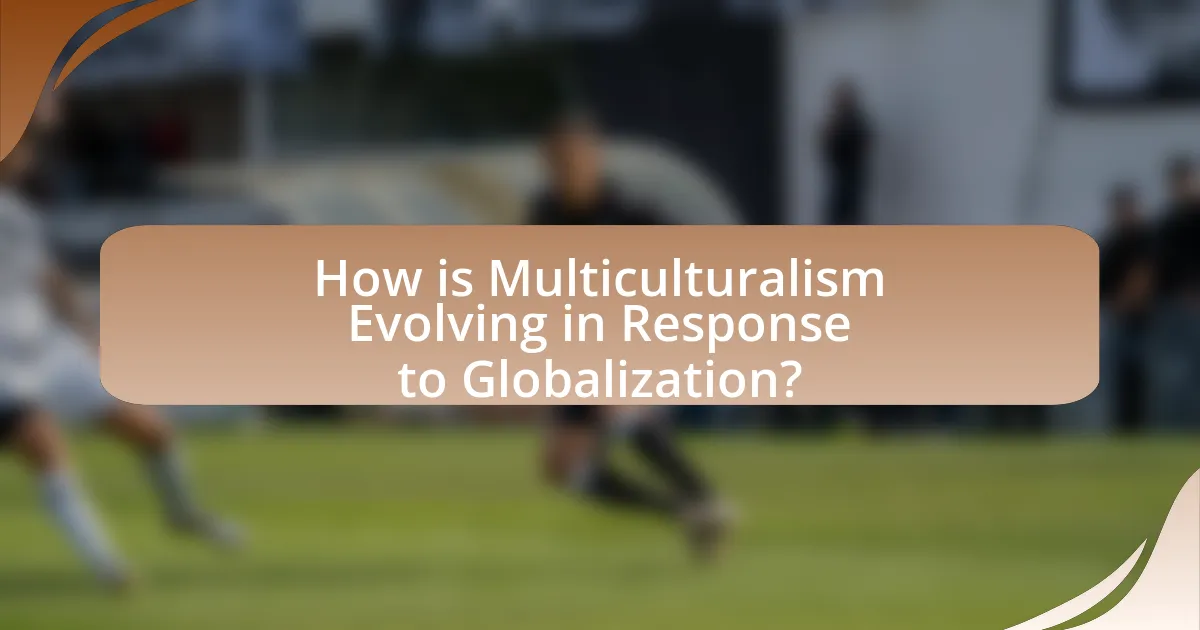
How is Multiculturalism Evolving in Response to Globalization?
Multiculturalism is evolving in response to globalization by increasingly embracing hybrid identities and intercultural exchanges. As global interconnectedness grows, individuals and communities are blending cultural practices, leading to a more fluid understanding of identity. For instance, the rise of digital communication platforms facilitates cross-cultural interactions, allowing diverse cultural expressions to influence one another. According to a 2020 study by the Pew Research Center, 72% of people in multicultural societies report that they value cultural diversity, indicating a shift towards acceptance and integration of multiple cultural identities. This evolution reflects a broader trend where multiculturalism adapts to the realities of a globalized world, fostering inclusivity while navigating the complexities of cultural preservation and adaptation.
What trends are shaping the future of multiculturalism?
The future of multiculturalism is being shaped by globalization, technological advancements, and shifting demographics. Globalization facilitates cultural exchange and interaction, leading to increased awareness and acceptance of diverse cultures. Technological advancements, particularly in communication, enable individuals to connect across borders, fostering a global community that values multicultural perspectives. Additionally, shifting demographics, driven by migration and changing birth rates, contribute to more diverse societies, necessitating policies that promote inclusivity and representation. These trends collectively influence how multiculturalism is perceived and practiced in various regions, highlighting the importance of adaptability and mutual respect in increasingly diverse environments.
How are migration patterns influencing multicultural dynamics?
Migration patterns significantly influence multicultural dynamics by facilitating the exchange of cultural practices, languages, and social norms among diverse populations. As individuals move across borders, they bring their unique cultural identities, which can lead to the creation of multicultural societies where various traditions coexist. For instance, cities like Toronto and London have become cultural melting pots due to high levels of immigration, resulting in vibrant communities that celebrate a multitude of cultural festivals and cuisines. This cultural exchange not only enriches local societies but also fosters greater understanding and tolerance among different ethnic groups, as evidenced by studies showing that multicultural environments can enhance social cohesion and reduce prejudice.
What role do social movements play in promoting multiculturalism?
Social movements play a crucial role in promoting multiculturalism by advocating for the rights and recognition of diverse cultural identities. These movements mobilize individuals and communities to challenge systemic inequalities and promote inclusivity, thereby fostering a society that values cultural diversity. For instance, the Civil Rights Movement in the United States significantly advanced multiculturalism by fighting against racial discrimination and advocating for equal rights, which led to legislative changes such as the Civil Rights Act of 1964. Additionally, contemporary movements like Black Lives Matter and LGBTQ+ rights organizations continue to highlight the importance of multiculturalism by addressing issues of representation and social justice, demonstrating that social movements are instrumental in shaping a more inclusive society.
How do governments respond to the challenges of multiculturalism?
Governments respond to the challenges of multiculturalism through policies aimed at promoting integration, ensuring equal rights, and fostering social cohesion. For instance, many countries implement anti-discrimination laws to protect minority groups and promote inclusivity. Additionally, governments may establish multicultural education programs that encourage understanding and respect among diverse cultural groups. Research indicates that nations like Canada and Australia have adopted official multicultural policies, which have been shown to enhance social harmony and economic participation among immigrants. These approaches demonstrate a commitment to addressing the complexities of multicultural societies while aiming to mitigate potential conflicts and promote unity.
What policies are effective in supporting multicultural integration?
Effective policies for supporting multicultural integration include inclusive education programs, anti-discrimination laws, and community engagement initiatives. Inclusive education programs promote understanding and respect for diverse cultures, which fosters social cohesion. Anti-discrimination laws protect individuals from bias based on ethnicity, religion, or nationality, ensuring equal opportunities and rights. Community engagement initiatives encourage collaboration among different cultural groups, enhancing mutual respect and understanding. Research by the Migration Policy Institute indicates that countries with strong anti-discrimination frameworks and community programs experience higher levels of social integration and lower instances of ethnic conflict.
How do educational systems adapt to promote multicultural understanding?
Educational systems adapt to promote multicultural understanding by integrating diverse curricula that reflect various cultural perspectives and histories. This approach includes the incorporation of multicultural education, which emphasizes the importance of understanding and respecting different cultures, languages, and traditions. For instance, many educational institutions implement programs that celebrate cultural diversity through events, literature, and history lessons that highlight contributions from various ethnic groups. Research indicates that such inclusive practices not only enhance students’ cultural awareness but also improve social cohesion and reduce prejudice, as evidenced by studies showing that students exposed to multicultural education demonstrate greater empathy and acceptance towards peers from different backgrounds.
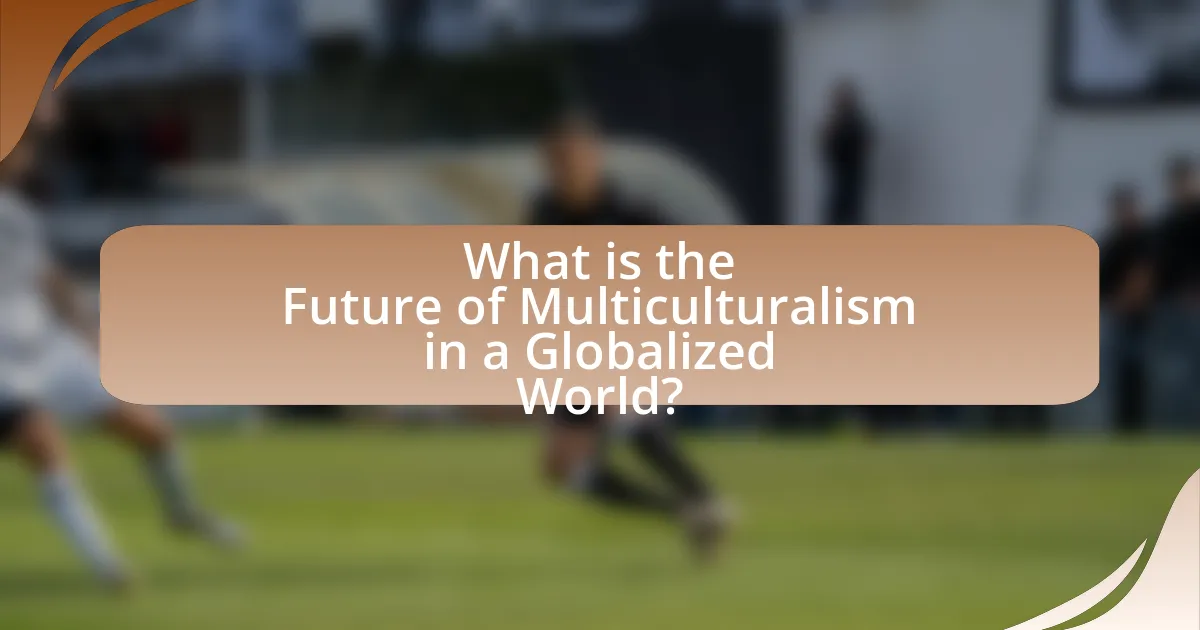
What is the Future of Multiculturalism in a Globalized World?
The future of multiculturalism in a globalized world is likely to involve increased integration and interaction among diverse cultures, leading to both opportunities and challenges. As globalization facilitates the movement of people, ideas, and goods across borders, multiculturalism can thrive through the exchange of cultural practices and perspectives. However, this same globalization can also provoke backlash against multiculturalism, as seen in rising nationalism and xenophobia in various regions. According to a 2020 Pew Research Center study, 70% of people in advanced economies believe that immigration has made their country a better place, indicating a positive outlook on multiculturalism. Yet, the same study highlights that significant portions of the population express concerns about cultural dilution and economic competition. Thus, the future of multiculturalism will depend on how societies navigate these complexities, balancing the benefits of cultural diversity with the need for social cohesion.
How can multiculturalism thrive in an increasingly globalized society?
Multiculturalism can thrive in an increasingly globalized society by fostering inclusive policies that promote cultural exchange and mutual respect among diverse communities. Governments and organizations can implement educational programs that emphasize the value of cultural diversity, which has been shown to enhance social cohesion and economic innovation. For instance, research from the McKinsey Global Institute indicates that diverse teams are 35% more likely to outperform their homogeneous counterparts in terms of profitability and value creation. Additionally, creating platforms for dialogue and collaboration among different cultural groups can strengthen community ties and reduce xenophobia, as evidenced by successful multicultural initiatives in cities like Toronto and Melbourne.
What strategies can communities adopt to foster multiculturalism?
Communities can adopt several strategies to foster multiculturalism, including promoting inclusive policies, organizing cultural exchange programs, and supporting local multicultural events. Inclusive policies, such as anti-discrimination laws and equitable access to resources, create an environment where diverse groups feel valued and respected. Cultural exchange programs, like language classes and art workshops, encourage interaction and understanding among different cultural groups. Additionally, supporting local multicultural events, such as festivals and food fairs, allows communities to celebrate diversity and build connections. These strategies have been shown to enhance social cohesion and reduce prejudice, as evidenced by studies indicating that communities with active multicultural initiatives report higher levels of community satisfaction and lower levels of discrimination.
How can technology be leveraged to enhance multicultural interactions?
Technology can be leveraged to enhance multicultural interactions by facilitating communication and collaboration across diverse cultural backgrounds. Tools such as video conferencing, social media platforms, and translation applications enable individuals from different cultures to connect, share ideas, and collaborate on projects in real-time, regardless of geographical barriers. For instance, platforms like Zoom and Microsoft Teams allow for virtual meetings that can include participants from various countries, fostering a sense of community and understanding. Additionally, translation technologies, such as Google Translate, break down language barriers, making it easier for people to engage in meaningful conversations. According to a study by the Pew Research Center, 72% of adults believe that technology has improved their ability to communicate with people from different cultures, highlighting its role in promoting multicultural interactions.
What role does individual responsibility play in promoting multiculturalism?
Individual responsibility is crucial in promoting multiculturalism as it encourages individuals to actively engage with and respect diverse cultures. When individuals take responsibility for their actions and attitudes, they contribute to a more inclusive society by challenging stereotypes and fostering understanding among different cultural groups. Research indicates that communities with high levels of individual engagement in multicultural initiatives, such as cultural exchange programs and local diversity events, experience greater social cohesion and reduced prejudice. For instance, a study by the Pew Research Center found that individuals who participate in multicultural activities are more likely to support policies that promote diversity and inclusion, demonstrating the positive impact of personal accountability on societal attitudes toward multiculturalism.
How can individuals contribute to a more inclusive society?
Individuals can contribute to a more inclusive society by actively promoting diversity and advocating for equal rights. Engaging in community initiatives, such as volunteering for organizations that support marginalized groups, fosters understanding and collaboration among different cultures. Research indicates that diverse teams lead to better problem-solving and innovation, as highlighted in a study by McKinsey & Company, which found that companies in the top quartile for ethnic diversity are 35% more likely to outperform their peers. By educating themselves and others about cultural differences and challenging discriminatory practices, individuals can help dismantle systemic barriers and create a more equitable environment for all.
What actions can be taken to combat xenophobia and promote acceptance?
To combat xenophobia and promote acceptance, educational initiatives that foster intercultural understanding are essential. These initiatives can include school programs that teach the history and contributions of diverse cultures, which have been shown to reduce prejudice and increase empathy among students. Research from the American Psychological Association indicates that exposure to diverse perspectives can significantly decrease xenophobic attitudes. Additionally, community engagement activities that encourage interaction between different cultural groups can help build relationships and dismantle stereotypes. Programs like cultural festivals or dialogue circles have proven effective in various cities, demonstrating that shared experiences can enhance social cohesion and acceptance.
What are the best practices for fostering multiculturalism in diverse societies?
The best practices for fostering multiculturalism in diverse societies include promoting inclusive policies, encouraging intercultural dialogue, and providing education on cultural awareness. Inclusive policies, such as anti-discrimination laws and equitable access to resources, create an environment where all cultural groups feel valued and respected. Intercultural dialogue initiatives, like community forums and cultural exchange programs, facilitate understanding and collaboration among different groups. Education on cultural awareness, integrated into school curricula, helps individuals recognize and appreciate diversity from an early age. These practices are supported by research indicating that societies with strong multicultural frameworks experience lower levels of conflict and higher levels of social cohesion, as evidenced by studies from the Pew Research Center showing that inclusive societies tend to have better economic outcomes and social stability.


